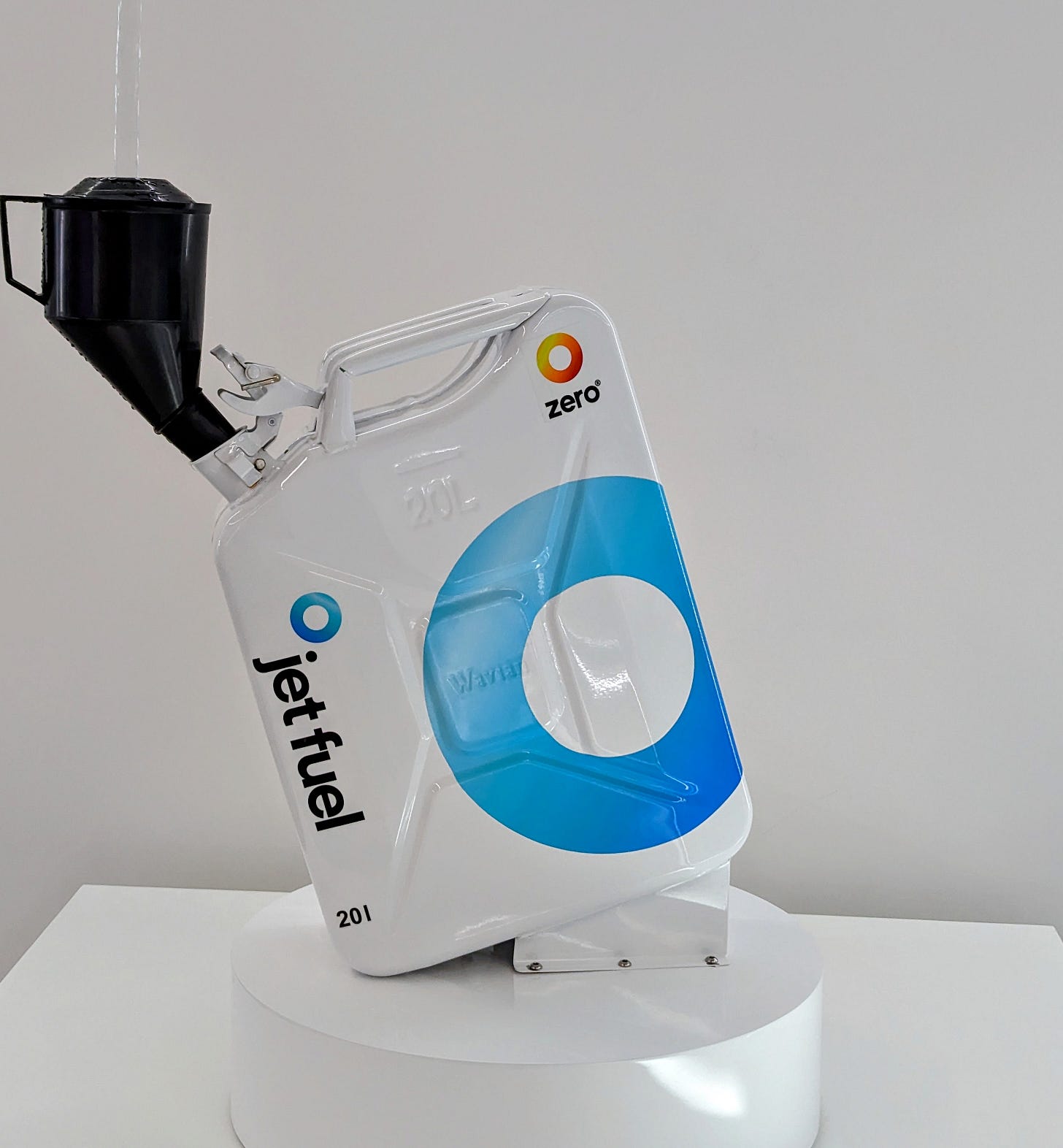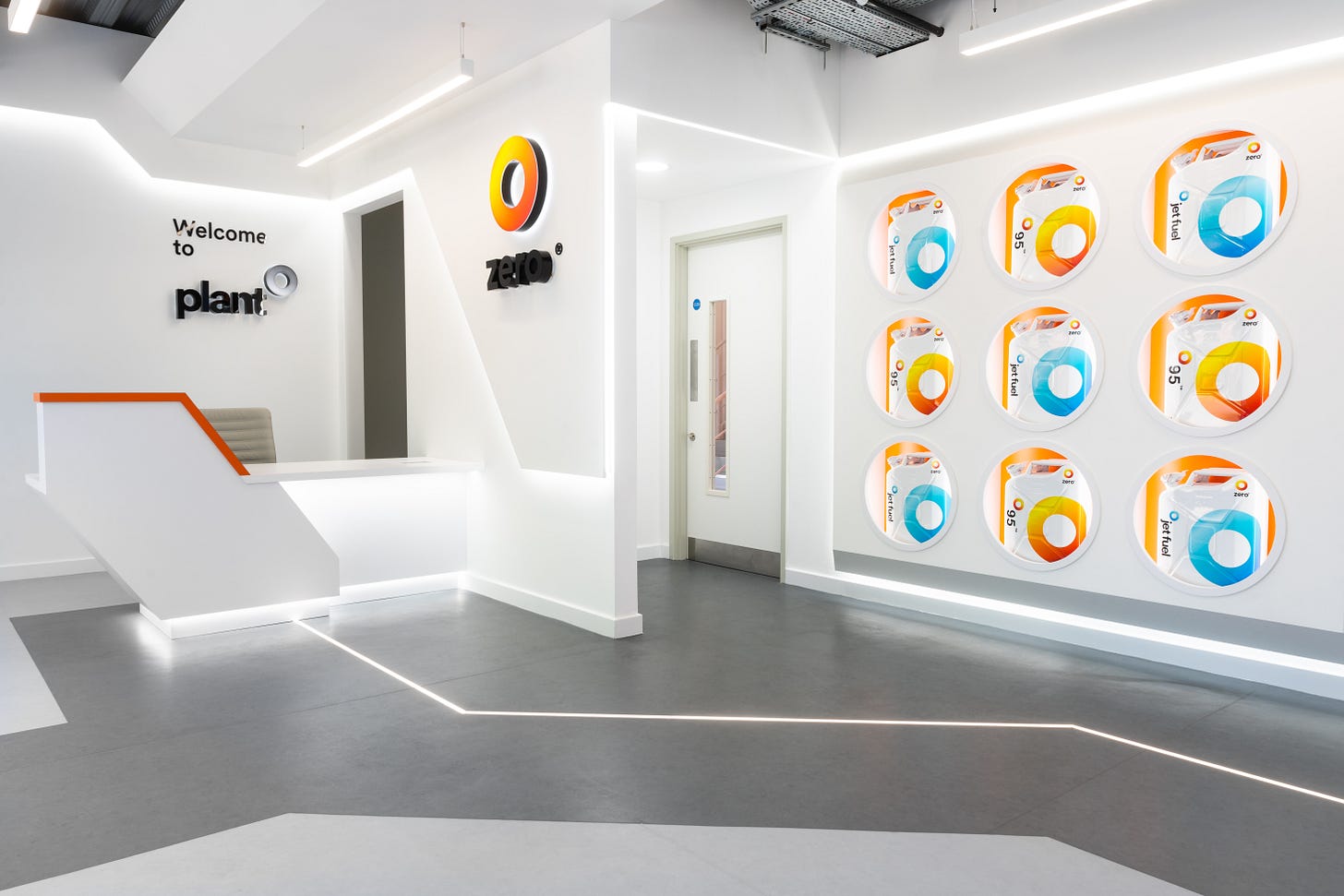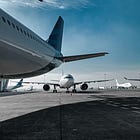From Zero to Hero: New UK company takes on aviation's decarbonisation challenge
Synthetic fuel plant the first step to commercialisation and scale
Summary
'Zero' is a new company that aims to produce Sustainable Aviation Fuel using renewable energy.
Its e-fuel combines hydrogen with CO2 captured from the air.
The first step is certification by next year. Zero then intends to produce e-fuels at a scale.
Zero has its own proprietary version of the Fischer-Tropsch process, the standard way of making synthetic fuels, which it says is more energy efficient.
It says that once it scales, its fuel will eventually be price competitive with conventional jet fuel.
Commercial aviation is an important market for Zero, but the company is also looking at the military thanks to a collaboration with Britain's RAF.
Zero also wants to make carbon-neutral fuel for the automotive and maritime industries.
Why we need a 'drop-in' fuel for aviation
As of September 2022, the world's airlines were flying 24,000 aircraft. That number is set to grow thanks to bumper orders from airlines such as IndiGo, Air India, Ryanair and United Airlines.
Given that the lifespan of a commercial aircraft is about 30 years, the planes flying in our skies in 2050 will look much like the aircraft flying today. This is why the aviation industry is emphasising the use of Sustainable Aviation Fuel (SAF), a fuel that works with today's aircraft, but is not made from fossil fuels and has a lower carbon footprint.
The newest SAF producer is the UK-based 'Zero', which on June 14th opened the doors to its first synthetic fuels facility, which it calls ‘Plant Zero.1’.
We spoke to Zero's commercial director Kwame Bekoe to find out more about the company and its plans.
Zero's elevator pitch
Zero was founded by Paddy Lowe, who spent over 30 years working in Formula 1 Racing, and chemistry professor Nilay Shah.
"Zero is really about de-fossilising industries", says Kwame Bekoe. "We're producing guilt-free, synthetic liquid fuels."
Unlike biofuel, which uses feedstock like soya beans, miscanthus or used cooking oil, Zero is making e-fuel (also called Power-to-Liquid (PtL) fuel) that is synthetically produced.
As Bekoe says, they are using feedstocks that have an unlimited scale — air and water. The water is then turned into oxygen and hydrogen in an electrolyser that runs on renewable energy. Subsequently, the hydrogen is then combined with CO2 taken from a direct air capture unit to make fuel.
A small test facility leading to certification
Zero’s new facility in Bicester, Oxfordshire will house both the electrolysis process as well as the direct air capture unit. However, with Plant Zero.1 looking slightly like a microbrewery, the quantities produced will initially be very small.
Bekoe says this is deliberate and they’re producing the quantity necessary for to reach ASTM certification. (The American Society for Testing Materials (ASTM) standard sets requirements such as composition, volatility, fluidity and many other factors to ensure that the fuel is compatible when blended.)
"Our plan is to reach certification by the middle of next year at the latest", says Bekoe. "Once there, we will not only continue to develop fuels in this lab but also use it for R&D testing and training purposes."
From concept to reality: The journey of Zero's e-fuels
Bekoe says that Zero is aware that in order to commercialise their product, they need a large facility with access to renewable energy. While the company has not settled on one location yet, they are examining several where the cost of renewables — especially solar power — is cheap.
Of course, it helps that the e-fuel that Zero makes does not need as much energy to produce as other synthetic fuels. The most commonly used synthetic fuel production method, called Fischer-Tropsch, loses up to 80% of the energy that is put in. Zero says it can be significantly more efficient than Fischer-Tropsch with its own proprietary production method called “DirectFT®”.
Bekoe says their process will reduce the cost of SAF, which can be two to eight times the cost of conventional jet fuel. He points to the development of solar from the 1970s onwards — solar power eventually turned from being the most expensive to the cheapest power, thanks to a mix of innovation, manufacturing scale and government incentives.
Opportunities and the road ahead
The increasing worldwide demand for synthetic fuels was recently demonstrated by two significant changes to EU regulations:
The ReFuel EU aviation fuel-blending mandate has increased the requirements for the use of synthetic fuel in aviation from 28% to 35% by 2050
The proposed ban on the sale of vehicles with internal combustion engines (ICE) from 2035 has been eased to still permit ICE cars that are powered by synthetic fuel.
In fact, commercial aviation is only one sector that Zero is targeting. The company has a successful collaboration with Britain's Royal Air Force (RAF). Once Zero's fuel is certified, the RAF will stage an all-SAF jet flight. Zero also aims to target both the maritime and automotive industries, with some manufacturers looking at e-fuels as a substitute fuel.
"We're talking about a $4.75 trillion marketplace by 2050", said Bekame. "And we feel that synthetic fuels are going to take up at least 50% of that market."
Our take
Zero is one of a growing number of e-fuel companies such as Synhelion, Dimensional Energy, Twelve and Air Company.
However, the supply isn't anywhere near the potential demand. The other companies we’ve mentioned already have forward orders from airlines, despite having actually produced very little.
As a result, once Zero's fuel is certified for use, there's no reason why the company shouldn't succeed.
With environmentalists claiming that airlines are using more than their fair share of renewable energy in SAF production, Zero’s ability to improve on the almost 100-year-old Fischer-Tropsch method will be the key to its success.





